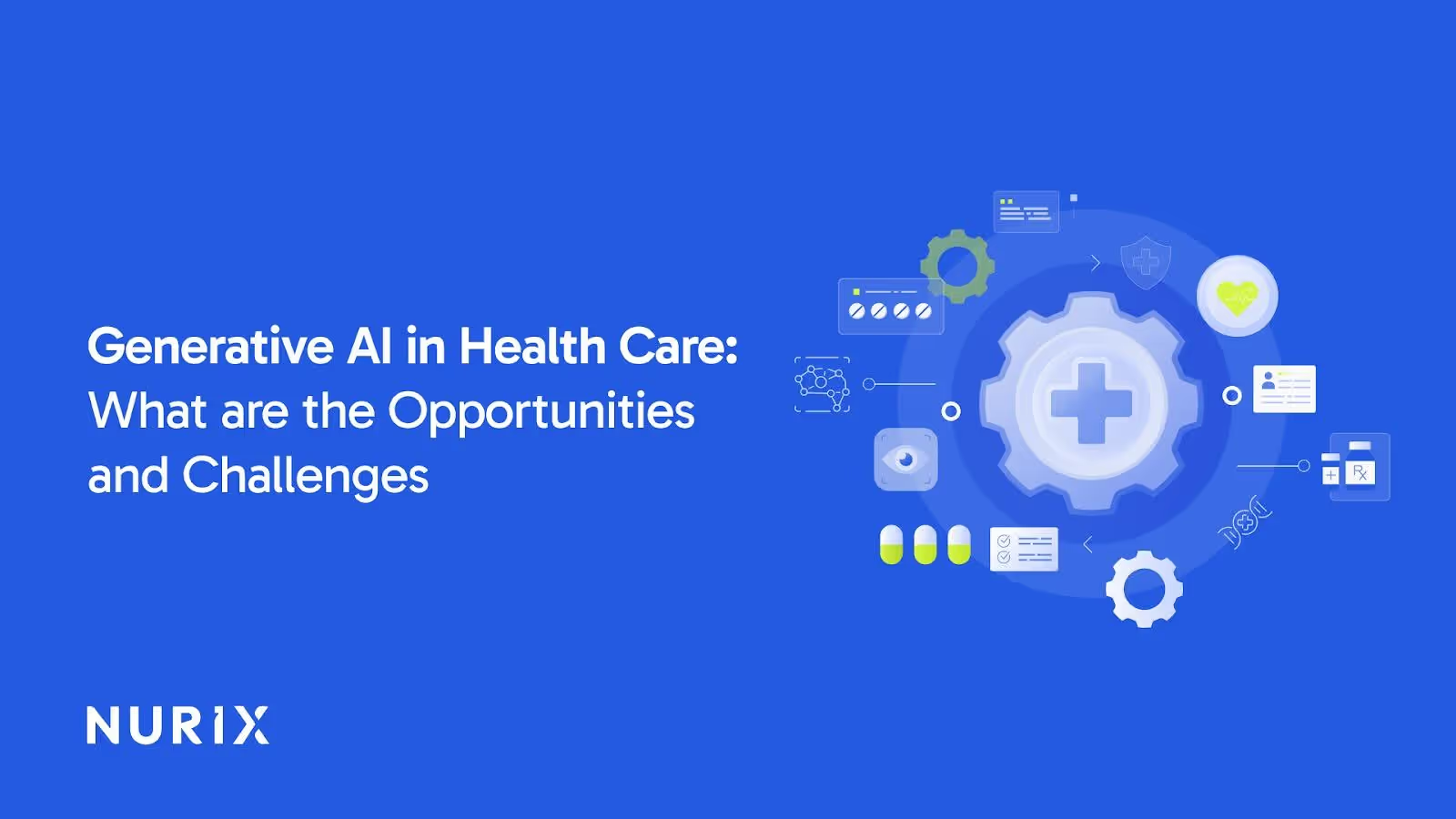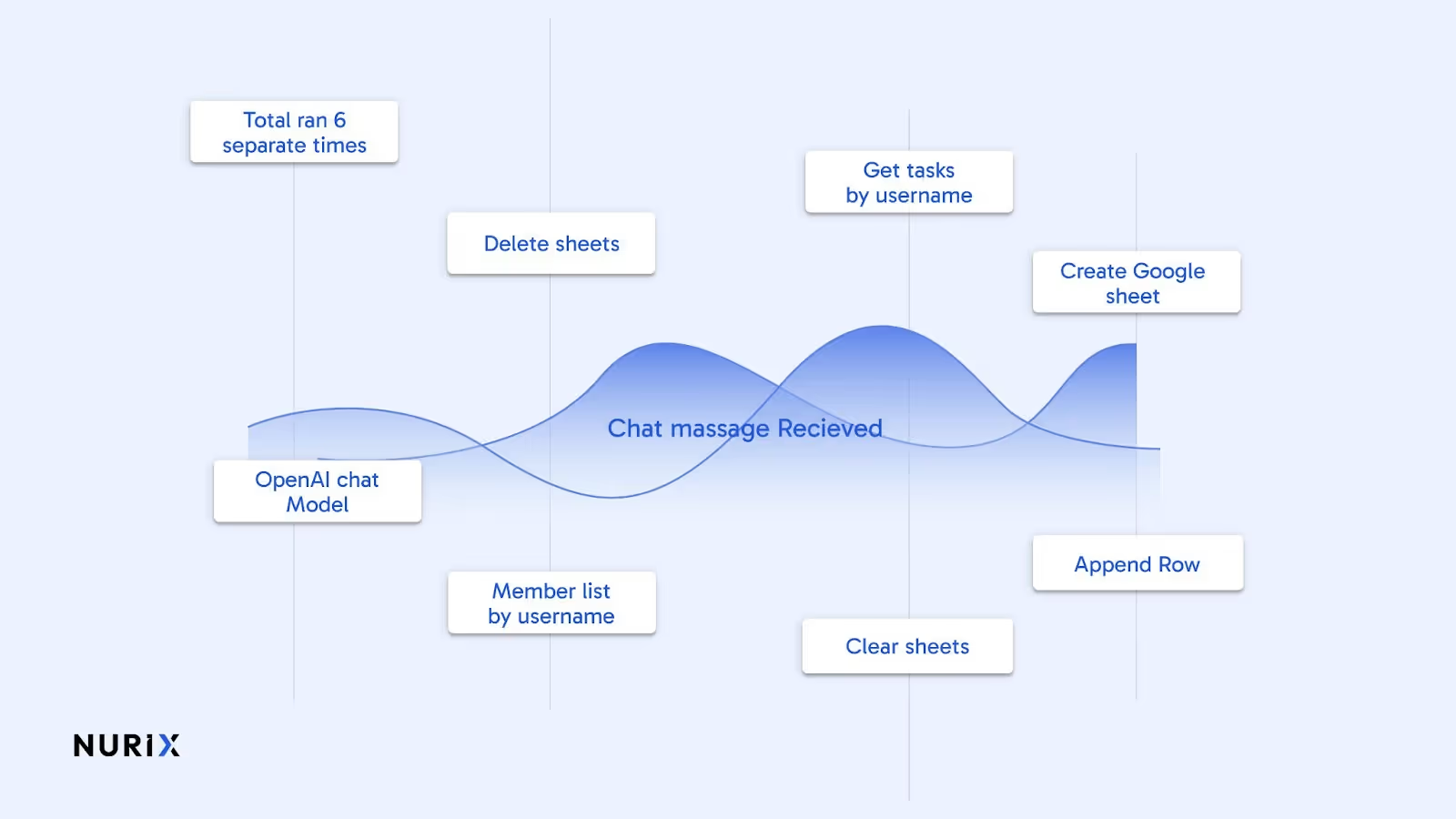Generative AI in Health Care: What are the Opportunities and Challenges


Don’t miss what’s next in AI.
Subscribe for product updates, experiments, & success stories from the Nurix team.
The healthcare industry stands on the brink of a technological revolution, with generative AI emerging as a key driver of change. From automating administrative tasks to accelerating drug discovery, this technology holds the potential to reshape how healthcare is delivered. Yet, as promising as it is, the road to widespread adoption is not without its hurdles. Challenges such as data privacy concerns, integration complexities, and the need for regulatory clarity continue to cloud its potential.
Despite these obstacles, the global value of generative AI in healthcare is expected to surge, growing from $1.8 billion in 2023 and is expected to grow at a CAGR of 33.2% from 2024 to 2032. This rapid expansion reflects its growing influence in improving patient care, streamlining clinical operations, and advancing medical research.
As we explore both the opportunities and challenges, it's clear that generative AI could very well be the catalyst that drives the next wave of healthcare innovation.
Understanding Generative AI in Healthcare
Generative AI in healthcare uses machine learning to create new data and insights from existing medical information. Unlike traditional AI, it synthesizes content such as medical images and treatment plans, improving clinical care and research.
By analyzing diverse datasets, medical records, imaging, and genomics, generative AI enables more precise, personalized care and automates administrative tasks, improving efficiency and reducing errors.
In research, it accelerates drug discovery and generates synthetic data for rare diseases. Despite challenges like data privacy and bias, generative AI has the potential to transform healthcare delivery, improving both clinical and operational outcomes.
Having explored the fundamentals of generative AI in healthcare, it is clear that its potential extends far beyond theoretical applications. Now, let's examine the specific opportunities this technology presents in transforming patient care, operational processes, and medical research.
This could be your next read: How to Build a Generative AI Team for Your Applications
Opportunities Presented by Generative AI in Healthcare
Generative AI is poised to redefine healthcare by addressing long-standing challenges with innovative solutions that improve decision-making, efficiency, and research. Its ability to synthesize complex data and generate insights offers unparalleled opportunities for improving patient care and operational effectiveness.
Below, we explore key areas where generative AI is making a transformative impact.
Improving Clinical Care and Decision-Making
Generative AI is paving the way for more accurate diagnoses and personalized treatment, ultimately improving patient care.
- Improved Diagnostics and Disease Detection
Generative AI significantly improves diagnostic capabilities by analyzing medical images and detecting patterns that might be overlooked by human practitioners.
These systems can identify early warning signs of diseases, supporting faster and more accurate diagnoses. They can also predict cardiovascular risk factors from retinal images and identify biomarkers for complex conditions, leading to earlier interventions and better patient outcomes.
- Personalized Treatment Planning
One of the most promising applications of generative AI is the development of customized treatment plans. By analyzing a patient's unique health data, including genetic information, generative AI can help clinicians develop highly personalized approaches to care.
These systems process information from wearable devices in real-time to monitor vital health indicators, facilitating early intervention strategies customized to individual needs. For mental health, generative AI creates interactive tools for cognitive behavioral therapy, making personalized psychological care more accessible.
- Risk Prediction and Preventive Care
Generative AI excels at analyzing extensive and varied datasets to forecast outcomes like hospital readmissions and recommend proactive measures for patient well-being.
By categorizing populations based on risk factors, these systems improve the effectiveness of interventions by targeting high-risk groups, leading to more proactive and preventive healthcare approaches.
Streamlining Operations and Reducing Burnout
By automating administrative tasks and optimizing workflows, AI is helping healthcare professionals focus more on patient care while reducing burnout.
- Administrative Efficiency
Generative AI automates time-consuming administrative tasks, particularly medical documentation.
This automation not only improves efficiency but also addresses a significant factor in clinician burnout by freeing healthcare professionals to focus more on direct patient care rather than paperwork.
- Workflow Optimization

Healthcare organizations are using generative AI to optimize clinical workflows and resource allocation. These systems can analyze patterns in hospital operations, predict service demands, and help manage staff and resources more effectively.
Implementation of generative AI can make healthcare delivery more efficient, equitable, and effective across various applications, including billing, diagnosis, and treatment.
Explore more : How Nurix AI Simplified Healthcare Appointment Booking at Scale
- Improved Interoperability
Generative AI has the potential to improve interoperability across healthcare systems by reformatting data to comply with specific standards.
This capability helps bridge communication gaps between different healthcare platforms and organizations, leading to more coordinated care.
Advancing Medical Research and Innovation
Generative AI is accelerating drug discovery and enabling groundbreaking research, creating new possibilities for medical advancements.
- Accelerated Drug Discovery
Generative AI is revolutionizing pharmaceutical research by accelerating drug discovery processes. The Generative Tensorial Reinforcement Learning (GENTRL) model has demonstrated effectiveness in designing drugs customized to specific biological mechanisms, making sure of more optimal interactions with targeted biological systems.
This technology is already showing results, with the first drug entirely designed with generative AI entering clinical trials recently.
- Synthetic Data Generation
A particularly valuable application of generative AI is the creation of synthetic medical data. These artificially generated datasets can be used for research and training, especially for rare diseases where real patient data is limited.
This innovation opens new avenues for model training and simulation, improving research capabilities without compromising patient privacy.
- Pandemic Preparedness
Generative AI supports pandemic preparedness by analyzing vast datasets to predict disease spread and optimize response strategies.
During events like disease outbreaks, these systems improve the ability of health systems to deliver care remotely through mobile technologies and Internet of Things (IoT) devices.
Improving Patient Experience and Engagement
AI-driven virtual assistants and personalized communications are improving patient engagement and making healthcare more accessible.
- Virtual Health Assistants
Generative AI powers virtual health assistants that can provide immediate responses to patient queries, offer basic health guidance and support continuous patient engagement.
These tools make healthcare information more accessible and help patients better understand their conditions and treatment options.
- Personalized Health Communication
Generative AI can create customized health communications that resonate with patients based on their specific needs, preferences, and health literacy levels.
This personalization improves patient understanding and adherence to treatment plans, contributing to better health outcomes.
- Democratizing Healthcare Knowledge
One of the broader impacts of generative AI is its potential to democratize healthcare knowledge, making specialized expertise more widely available across different healthcare settings and geographical areas.
This democratization helps address disparities in healthcare access and quality.
With a clear understanding of the opportunities generative AI brings to healthcare, let's now look at real-world applications where this technology is already making an impact, driving tangible improvements in care and efficiency.
Here’s an interesting read: Exploring the Main Goal of Generative AI: Models, Tools, and Applications
Real-Life Applications of Generative AI in Healthcare
Generative AI is driving significant advancements in healthcare by improving patient care, operational efficiency, and medical research. Here are some real-world applications showcasing its transformative impact:.
- AlphaFold by DeepMind predicts protein structures with atomic-level accuracy, a breakthrough for drug discovery. By mapping millions of proteins, including those for diseases like COVID-19 and Parkinson's, it enables faster drug target identification, accelerating preclinical research and drug development.
- Insilico Medicine uses AI to design novel drug candidates, reducing the development timeline from 3-6 years to 18-24 months. The company's platform generates drug candidates based on specific disease mechanisms and optimizes properties like bioavailability and toxicity, improving the drug development process, especially for rare diseases.
- GPT-4 is used to convert clinician-patient interactions into clinical notes with high accuracy. This AI model saves time by auto-generating notes, reducing documentation time from 15 minutes to under 2 minutes per patient. It also aids in generating discharge summaries in patients' native languages, improving post-treatment adherence.
While generative AI is making significant strides in healthcare, its integration comes with various challenges that must be addressed. Let's now explore the key considerations for successfully implementing this technology in the healthcare sector.
Challenges and Considerations of Generative AI in Healthcare
The integration of generative AI in healthcare offers considerable promise, but it also brings a range of challenges that need careful attention. As the technology advances, addressing these hurdles is crucial for maintaining patient trust, data security, and ethical standards.
Below, we examine the key challenges that must be tackled to fully realize the potential of AI in healthcare.
Conclusion
While generative AI in healthcare offers transformative potential, its successful integration depends on overcoming significant challenges related to privacy, ethics, and infrastructure. The technology's rapid growth and increasing application in clinical settings underline its critical role in shaping the future of healthcare.
As stakeholders continue to refine its use, the real impact of generative AI will be measured not just by its technological advancements but by its ability to deliver sustainable, equitable improvements in patient outcomes.
Nuplay delivers enterprise-grade generative AI solutions focused on data integrity, system integration, and rigorous evaluation. These pillars guarantee secure, accurate, and reliable AI outputs, especially critical in sectors like healthcare.
- Robust Data Ingestion: Connects to diverse sources, making sure of consistent and high-quality data.
- Contextual Embedding: Uses retrieval-augmented generation (RAG) to customize responses to enterprise data.
- Continuous Monitoring: Regular updates and anomaly detection maintain data accuracy.
- Rapid Onboarding: Pre-built connectors make sure of quick project launches.
- Comprehensive Harmonization: Cleans and standardizes data for a single source of truth.
- Security & Compliance: Meets SOC 2, HIPAA, and GDPR standards with encrypted pipelines and access controls.
- Rigorous Testing: Makes sure of accuracy and adherence to ethical guidelines.
- AI Guardrails: Monitors for biases and hallucinations.
- Responsible AI: Ongoing improvements and transparency make sure of trustworthiness.
Start your AI journey with Nuplay, where data integrity and responsible AI deliver safe, impactful outcomes in healthcare and beyond. Get in touch with us!
Generative AI in healthcare analyzes complex medical data like imaging and genetic information to detect patterns that may be missed by humans, improving diagnostic precision.
Yes, generative AI in healthcare can accelerate the discovery of treatments for rare diseases by generating synthetic data, helping researchers overcome the challenge of limited patient data.
Generative AI in healthcare utilizes anonymization techniques and privacy-preserving models, such as federated learning, to protect patient data while still delivering valuable insights.
Generative AI in healthcare creates personalized patient communication, improving understanding and adherence to treatment plans, making healthcare more accessible and engaging.
Barriers to adopting generative AI in healthcare include regulatory uncertainty, integration challenges with existing systems, and concerns over algorithmic biases affecting patient outcomes.

Don’t miss what’s next in AI.
Subscribe for product updates, experiments, & success stories from the Nurix team.









